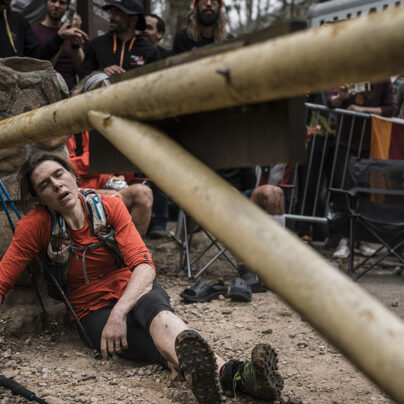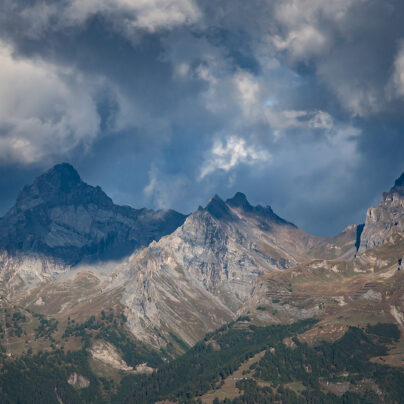It’ll Have Your Bones
Henley Phillips
Katie Visco ran 2,210 miles over 119 days from the northern coast in Darwin to Adelaide, through the Tanami, Central, and Simpson deserts, with bicycle support from her husband, Henley.
The desert wants you dead.
There is space without bounds here, but there is no place to live. No shelter or shade above your shins, no water to slake a thirst. Unless you can hunt the kangaroo, the bilby, or the bush turkey, you’ve nothing to eat. What resources exist are reserved for those few creatures who live and somehow thrive here. The wind blows, and the sun eternally bakes. Of all the inhabited corners of the earth, this is the driest, the Red Centre of Australia, and you are not meant to be here. Not for long at least. Even wild animals ‘turn up white bones’ – an Aussie phrase I learned in the first week, symbolising that the desert has won and picked clean your bones in the repetition of searing heat and blowing sand. By the time I leave Australia, and in the short weeks that follow, this vast desolation and dryness will contribute to the worst bushfires in the history of the country, burning over 25 million acres.
All of these realities come to me in the cool darkness of 4.00am before the sun begins to burn and the flies swarm. I’ve stopped pedalling and am resting 350lbs of food, water, and gear underneath me as my wife poops off to the side of the dirt road. Today she’ll run 30 miles, and I’ll pedal alongside with everything we need to keep the desert from swallowing us up – food, precious water, a shade tarp, sleeping bags and pads, spare running shoes, snacks, cooking equipment, solar panels, foam rollers and more. Thirty miles will bring us to 1,529 total miles. Nearly complete – a run across the Outback supported only by bicycle. It sounds and at times even feels noble not to use a motor vehicle for support, but as soon as the sun crests the eastern horizon, it sounds and certainly feels out of our grasp.
Katie walks over to me with the Shit Bag, containing both clean and dirty toilet paper to pack out, and I stow it in my frame bag. Temperatures are peaking around 105°F by late September in the northern reaches of South Australia, but the early hours before sunrise are cool and crisp. We hustle to gain ground. In the sky above us we can always count on the Southern Cross, Australia’s quintessential constellation, to assure we are headed in the right direction.
I simply can’t keep up with Katie’s running pace on the dirt roads. My bike lights illuminate Katie’s footprints over soft sand and through chunky corrugations. She’s half a mile ahead, not much, but in the pitch black of an Outback morning, it feels as though she’s being swept out to sea or rocketed into the night.
‘Shit!’ I’m pissed, and exhausted from the constant thrashing of the road day after day. The bike and trailer seem to be dragging along rather than rolling. Speaking of piss, I need to. The bike is too heavy to lay down on itself, so I initiate the balancing act I’ve learned. Dismount the bike. Saddle to the small of my back. Bury the tires in the sand a little. Just so. Can’t move much. Gotta keep the weight in equilibrium while I relieve myself.
I fail and pee all over my feet.
My bike lights illuminate Katie’s footprints over soft sand and through chunky corrugations. She’s half a mile ahead, not much, but in the pitch black of an Outback morning, it feels as though she’s being swept out to sea or rocketed into the night.
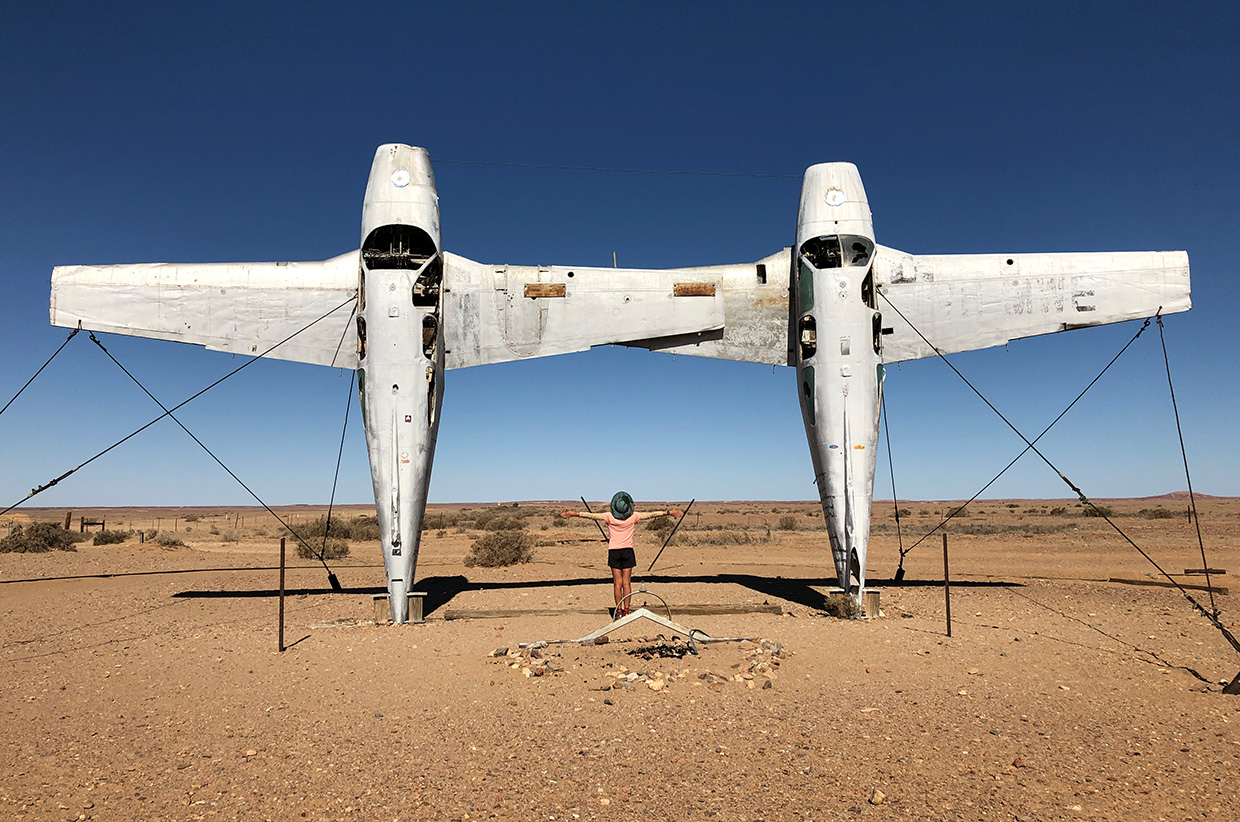
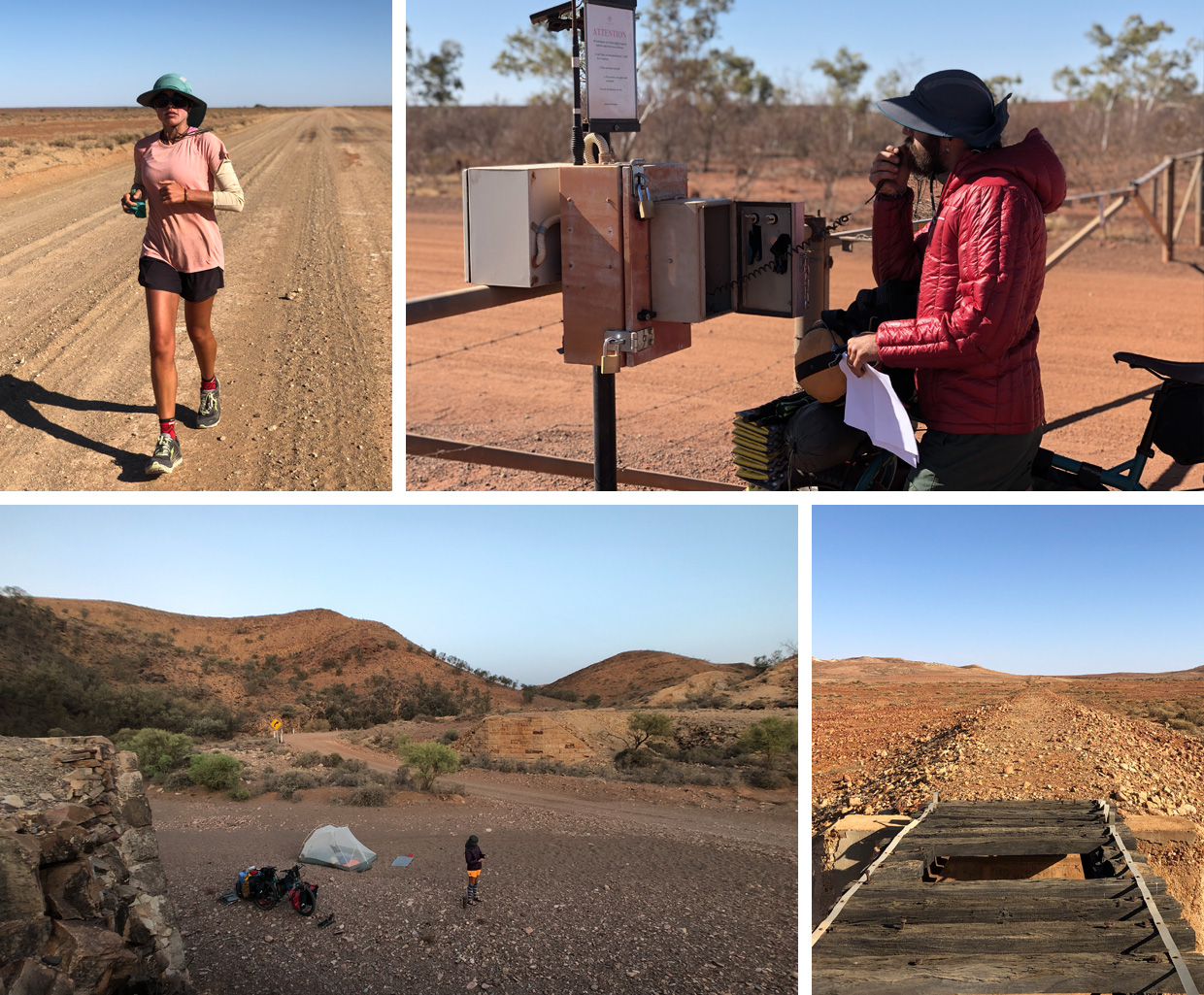
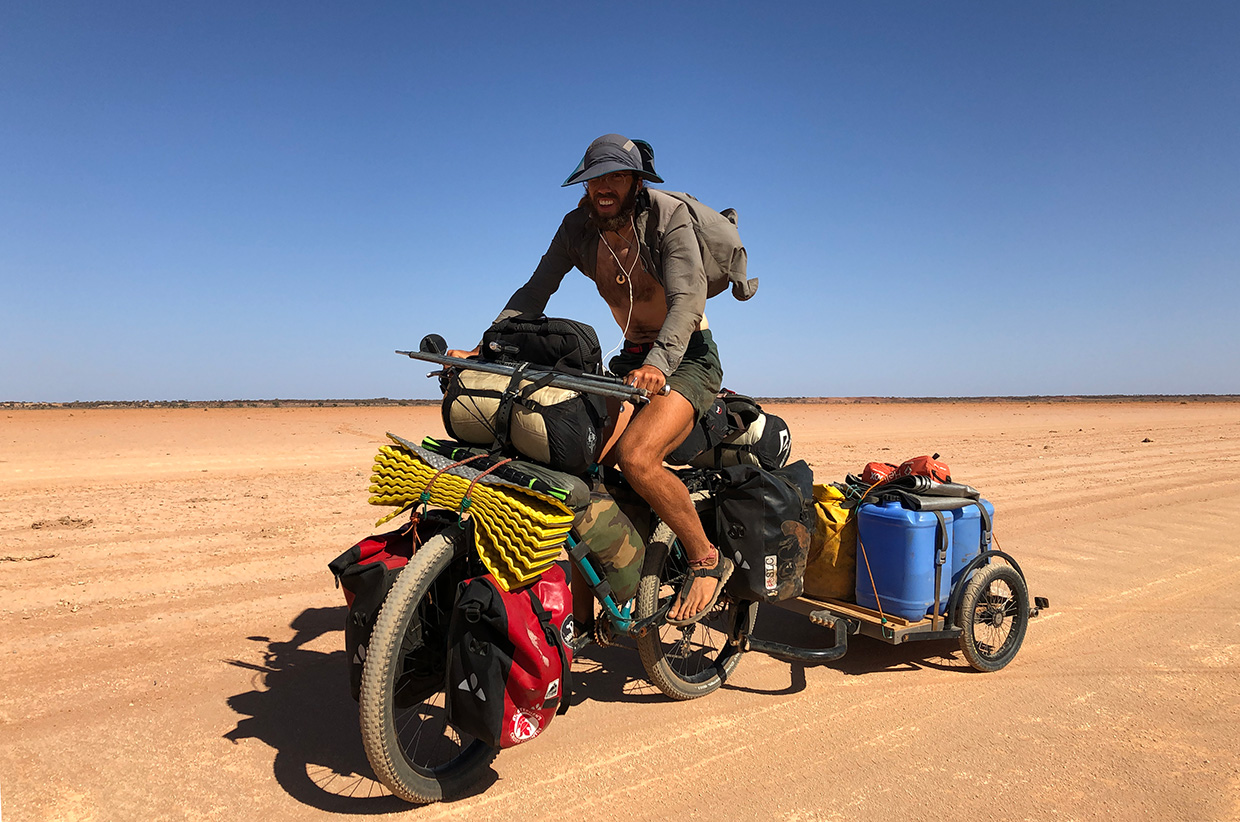
It hasn’t rained for seven years in this part of the Outback.
The drainages and floodways prove that a thing called water once flowed here. That moisture was ever known in this place feels as archaic and incomprehensible as the dinosaurs.
I wonder how long my bike will endure the sun, how long before it oxidises and joins the pantheon of burnt-out, upturned automobiles of the Outback.
We take a long break from 12-4.00pm every day to wait out the heat. It’s especially hot and still today, and we can do nothing but sweat and wait as these miserable hours tick by. We sparingly soak our shirts and bandanas for some cooling relief, but it’s useless on a calm day. We’re lulled into a heat daze and can’t find the energy to read or even listen to a podcast. The view from underneath our shade tarp looks like an overexposed photograph – the sharp blue sky bleached out and the beige earth a searing white.
We’ve carried over one of our 25L water jugs to keep it cool in the shade. I take a drink from it and almost spit it out, hot as coffee. It’s almost one o’clock. Three more hours to go.
It’s now 2.30pm and bloody hot. I wonder how long my bike will endure the sun, how long before it oxidises and joins the pantheon of burnt-out, upturned automobiles of the Outback. In the distant hot stillness, a rattle. A terrible broken rattle. The car passes our little refuge in the wash, doubles back to us, rattling, and we meet Rob Wilkinson.
‘I had to stop to see if yous was bloody alright. What are yous bloody doing out here?’
Rob’s in his mid-twenties and driving a loop of many thousands of miles ‘just to have a look around’. His face is red with heat, and, improbably, he’s dressed for the beach – shirt collar flipped up, swimmers and thongs. The tiny outpost of William Creek is only 17 miles away, and Rob’s headed there for cold beer before turning west for Coober Pedy. He’ll be there in 25 minutes. We’ll make it in tomorrow morning, and in an instant I resent Rob and how easily he can cover ground, how quickly and thoughtlessly he’ll drink something cold, how soon he’ll be softly asleep amongst the opal mines. He’ll fill gas and eat a Snickers and pour out water that’s gone hot in the back of his Prado. Arriving back home in New South Wales, maybe he’ll remember that miserable-looking couple baking under the weight of their own grand adventure. Maybe he won’t. We chat for too long in the open sun before saying goodbye, and I watch Rob speed away, gone in seconds.
Back under the tarp, we attempt to read a novel, but I grow exasperated and weary at my sweaty fingers. Our minds are consumed with the desire for cold water. Even cool water would do.
‘I can’t stop thinking about it. I want something cold so bad.’
Twenty minutes later, another car. This time it’s a ute and caravan and another man dressed to swim. He steps out, fiddles in the back seat, and walks briskly towards us with an arm held high.
‘Anyone out here like this needs a cold drink,’ the man tells us.
He hands us a sparkling water, and, without another word, retreats back to his air-conditioned car and drives away. The can’s so cold it hurts to hold. The logo and lettering are faded from many miles bashing around in a cooler.
‘Hint of lime!’ Katie gasps, but otherwise there is nothing else. We sip in quiet turns, and my teeth burn with deep hard cold.
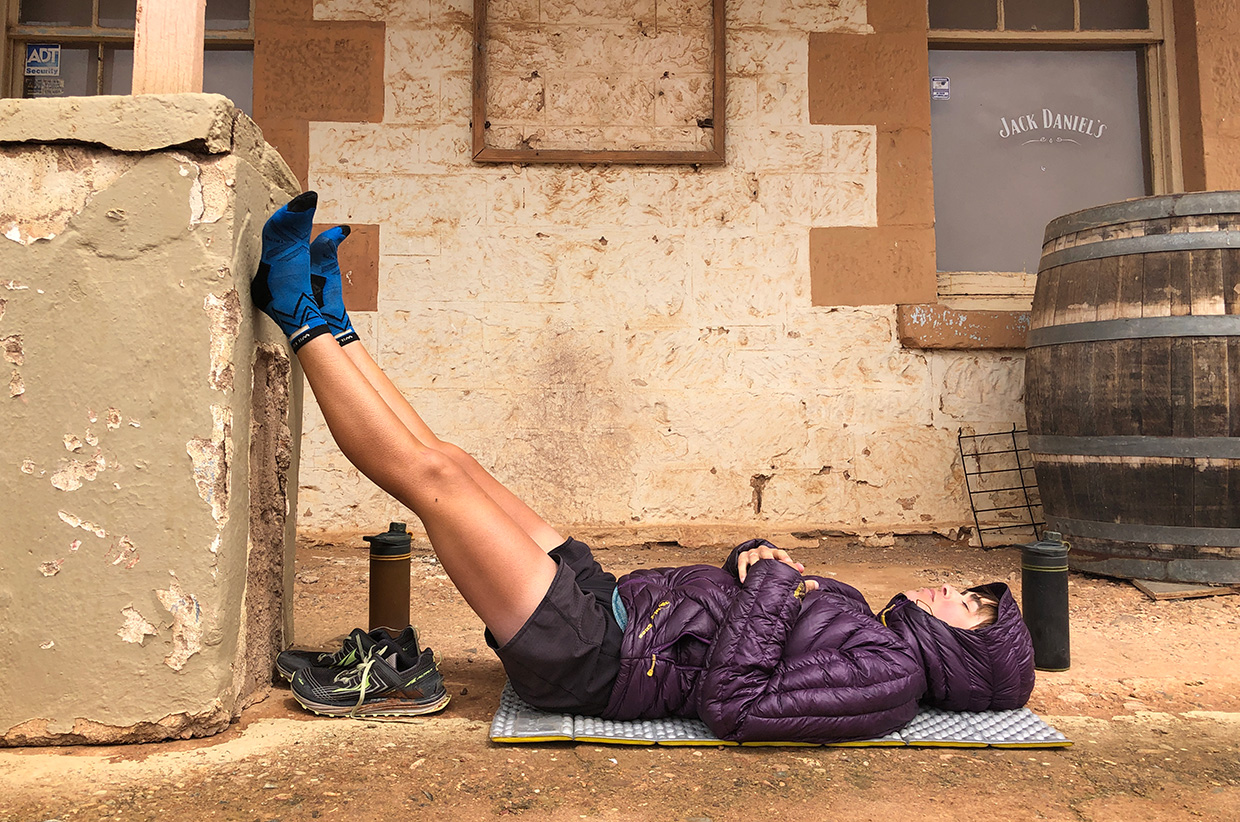
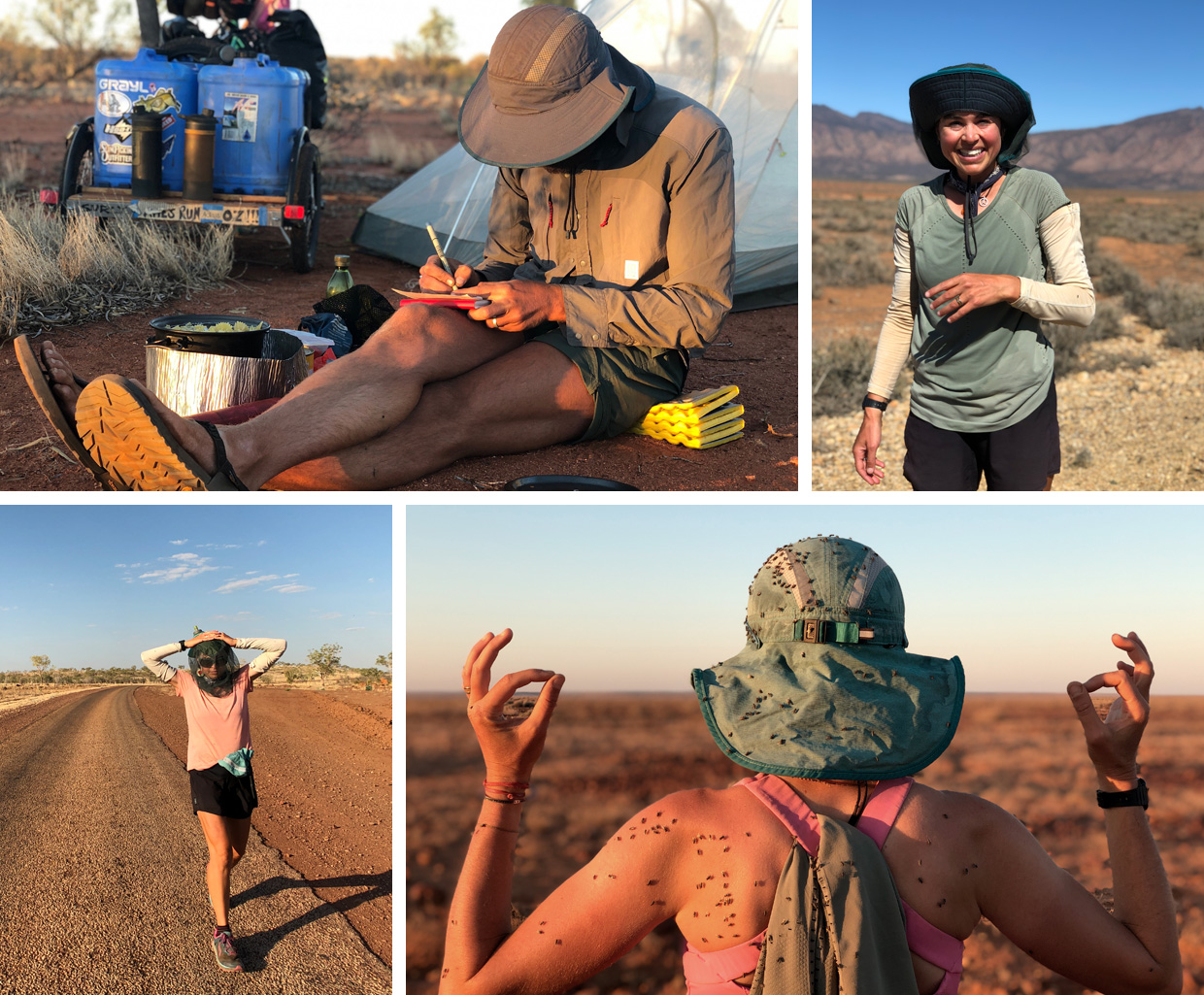
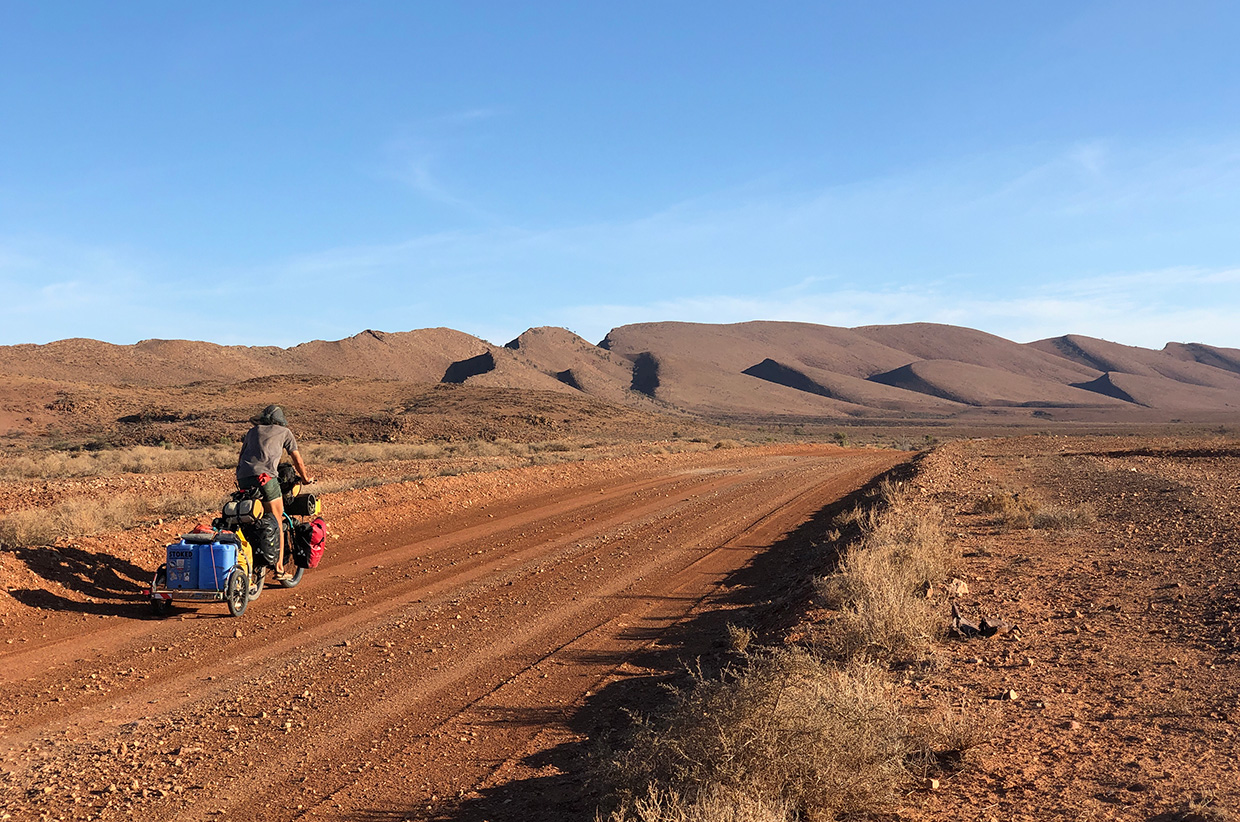
The next morning we’re blown into William Creek on a rare tailwind, albeit a sandstorm. Our bare skin is whipped red and raw from millions of grains of sand. After 20 minutes the storm calms. The dunes are brushed clean, left glossy and ready to betray the movements of the blue-tongued skink and the eastern brown snake.
Still miles out from town, I smell water. I grab the brakes and jerk my head up, instantly alert, frantic to see a pool or seep. How do you describe the scent of wet? The smell conjures up fond memories of another time – a dip in a Rocky Mountain river, sulphur springs in the Paluxy River, a time when the land around me felt pregnant with life. Something to give.
We’re ecstatic that our sense of smell has edged closer to that of a wild animal. We’ve adapted and feel included, a part of the greater whole of the Outback. I often wonder, though, what we must look like from above, from the bush pilot’s perspective or a rare passing tern. Do we look as much a part of this harsh desert interior as we feel? Each plant, insect, snake and giant red kangaroo allows the other to exist just so, and I grasp at placing ourselves among them.
We’ve found our place, but it is a temporary one. So far we haven’t turned up white bones, but we’ve conquered nothing. You don’t conquer the Tanami, the Simpson, or the Pedirka Deserts. Such a mindset falls well short of the scope and breadth of the vast interior of Australia. I look ahead and see the road curve towards a blur of color on the western horizon. Instinctually I know William Creek to be nestled there in that blur of colour, a clump of red river gums.
I pedal after it, and I’m struck with a sense of escaping as the white roadhouse comes into view.
Read another story from this adventure in Sidetracked Volume 17
So far we haven’t turned up white bones, but we’ve conquered nothing. You don’t conquer the Tanami, the Simpson, or the Pedirka Deserts. Such a mindset falls well short of the scope and breadth of the vast interior of Australia.


